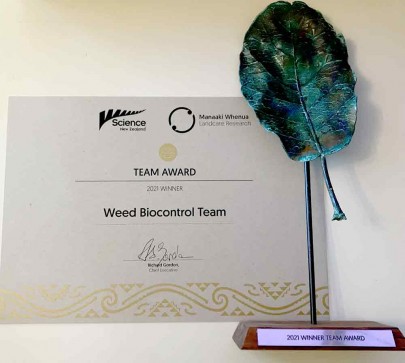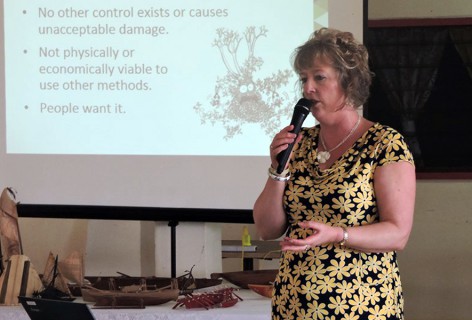Science New Zealand Team Award in the Bag
Team Leader Lynley Hayes with the award
“It’s wonderful to see the acknowledgement of our hard work over several decades,” said Team Leader Lynley Hayes. “But we didn’t do it alone – one of the reasons that our group has managed to be so successful is due to the steadfast support we have received from many quarters over the years.”
For two decades, regional and district councils and the Department of Conservation (DOC), operating as the National Biocontrol Collective, have pooled resources for weed biocontrol funding, undertaking collaborative decision-making about weed prioritisation and assisting with releases and monitoring of agents. In addition to these applied research programmes, fundamental, underpinning research is supported by the Ministry of Business, Innovation and Employment’s Strategic Science Investment Fund. This research has resulted in significant knowledge breakthroughs in weed biocontrol science to make it even safer and more effective, and also more cost-effective.
This award acknowledges the weed biocontrol group’s contributions to the sustainable management of invasive alien weeds in New Zealand. The group has conducted research facilitating the release of biocontrol agents to control serious intractable weeds across all regions of New Zealand, from native forests to farms throughout the North and South Islands. This research has benefited all sectors required to effectively and more sustainably manage invasive alien weeds, including government agencies such as regional councils and DOC, farmers and forestry operators, and community groups focused on saving local bush remnants.
Over the past three decades the weed biocontrol group has gained permission to release 45 weed biocontrol agents against 22 target weeds, and has worked with an additional 19 agents approved for release against seven target weeds in the years before MWLR (and its predecessor) came into being. Some of these programmes have been highly successful, with substantial economic and environmental benefits. There has been a 40,000-hectare reduction in infestations of heather (Calluna vulgaris) in Tongariro National Park resulting from the introduction of the heather beetle (Lochmaea suturalis). Economic analyses show that the Net Present Value for biocontrol of St John’s wort (Hypericum perforatum) is between $140 million and $1.49 billion over 70 years, with benefit-to-cost ratios of 10:1 and 100:1, respectively. The savings in control costs at the more conservative estimate of $140 million more than covers the costs of all weed biocontrol programmes in New Zealand to date. For ragwort (Jacobaea vulgaris), a major pasture weed, biocontrol is estimated to have saved the dairy industry approximately $44 million annually in herbicide costs alone, with a benefit-to-cost ratio of 14:1.

Science New Zealand team award 2021
In classical weed biocontrol, international collaboration is a crucial aspect since natural enemies are sought from all over the world, from wherever the target weeds originate. The group has been fortunate to work with researchers in Argentina, Australia, Canada, China, Chile, Colombia, Ecuador, France, Hawai‘i, India, Jamaica, Japan, Papua New Guinea, South Africa, Spain, Switzerland, the UK, the USA and Uruguay. They have also collaborated with researchers at AgResearch and Scion, and with five New Zealand universities.
From 2012 the MWLR weed biocontrol group has assisted developing countries in the Pacific with sustainable solutions for invasive weed management, with highly successful results already evident in the Cook Islands. In 2019 they were invited to become a founding partner of the Pacific Regional Invasive Species Management Support Service (PRISMSS). Better weed management in the Pacific will improve the well-being and livelihoods of people living in the Pacific by improving food security and human health, assisting with climate change adaptation, and protecting unique and threatened biosecurity.
Well done team and keep up the excellent work!
Current team members at MWLR: Alana Den Breeyen, Angela Bownes, Arnaud Cartier, Simon Fowler, Hugh Gourlay, Ronny Groenteman, Lynley Hayes, Richard Hill, Chris McGrannachan, Zane McGrath, Stephanie Morton, Quentin Paynter, Paul Peterson, Chantal Probst, Temo Talie, and Robyn White. Also acknowledged are former group members and others who have provided systematics, molecular, and other support.

